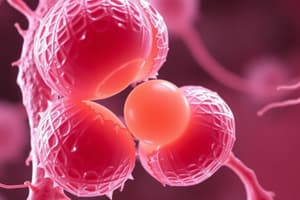Podcast
Questions and Answers
What is the outcome of the maturation process of oogonia after they differentiate into primary oocytes?
What is the outcome of the maturation process of oogonia after they differentiate into primary oocytes?
- They undergo mitosis to produce more oogonia.
- They enter meiosis and arrest during prophase I. (correct)
- They transition directly into mature ova.
- They all survive and develop into primordial follicles.
At what stage do primary oocytes become surrounded by a layer of flat epithelial cells?
At what stage do primary oocytes become surrounded by a layer of flat epithelial cells?
- After the degeneration of all other oogonia.
- During their mitotic division.
- Immediately following fertilization.
- When they begin developing into primordial follicles. (correct)
Which event marks the beginning of cell death in oogonia and primary oocytes?
Which event marks the beginning of cell death in oogonia and primary oocytes?
- The differentiation of oogonia begins.
- The total germ cell count reaches its maximum. (correct)
- Primary oocytes complete their first meiotic division.
- The primary oocytes are formed from oogonia.
What characterizes the diplotene stage that primary oocytes enter before birth?
What characterizes the diplotene stage that primary oocytes enter before birth?
What primarily happens to the majority of oogonia by the seventh month of development?
What primarily happens to the majority of oogonia by the seventh month of development?
What initiates the development of primordial follicles?
What initiates the development of primordial follicles?
What is the maximum number of germ cells reached during the development of oocytes?
What is the maximum number of germ cells reached during the development of oocytes?
Why do primary oocytes not complete their first meiotic division before puberty?
Why do primary oocytes not complete their first meiotic division before puberty?
What is the role of oocyte maturation inhibitor (OMI)?
What is the role of oocyte maturation inhibitor (OMI)?
Which layer develops as granulosa cells proliferate and form a stratified epithelium?
Which layer develops as granulosa cells proliferate and form a stratified epithelium?
How many primary oocytes are typically present at the onset of puberty?
How many primary oocytes are typically present at the onset of puberty?
What is the longest stage in the maturation of follicles?
What is the longest stage in the maturation of follicles?
What results from the coalescence of fluid-filled spaces between granulosa cells?
What results from the coalescence of fluid-filled spaces between granulosa cells?
What cellular change occurs in surrounding follicular cells as primordial follicles begin to grow?
What cellular change occurs in surrounding follicular cells as primordial follicles begin to grow?
What is the purpose of the finger-like processes extending from follicular cells?
What is the purpose of the finger-like processes extending from follicular cells?
During which phase does the follicle become known as a mature vesicular follicle or Graafian follicle?
During which phase does the follicle become known as a mature vesicular follicle or Graafian follicle?
What structure forms from the granulosa cells surrounding the oocyte at maturity?
What structure forms from the granulosa cells surrounding the oocyte at maturity?
What triggers the preovulatory growth phase in the secondary follicle?
What triggers the preovulatory growth phase in the secondary follicle?
What happens to the first polar body after meiosis I is completed?
What happens to the first polar body after meiosis I is completed?
Which of the following statements about meiosis II is correct?
Which of the following statements about meiosis II is correct?
What is the ploidy of the secondary oocyte?
What is the ploidy of the secondary oocyte?
Which of the following structures merges with the ovarian connective tissue?
Which of the following structures merges with the ovarian connective tissue?
What occurs to most follicles during the ovarian cycle?
What occurs to most follicles during the ovarian cycle?
What is the main function of the theca interna cells?
What is the main function of the theca interna cells?
Flashcards
What is Oogenesis?
What is Oogenesis?
The creation of mature oocytes from oogonia in the female gonad.
Where does Oogenesis begin?
Where does Oogenesis begin?
Primordial germ cells (PGCs) transform into oogonia within the female gonad.
How do oogonia appear at 3 months of gestation?
How do oogonia appear at 3 months of gestation?
Oogonia cluster together and are surrounded by flat epithelial follicular cells.
What happens to oogonia during Oogenesis?
What happens to oogonia during Oogenesis?
Signup and view all the flashcards
When does germ cell count peak?
When does germ cell count peak?
Signup and view all the flashcards
What happens to most germ cells during Oogenesis?
What happens to most germ cells during Oogenesis?
Signup and view all the flashcards
What happens to the surviving primary oocytes?
What happens to the surviving primary oocytes?
Signup and view all the flashcards
What maintains the arrested state of primary oocytes?
What maintains the arrested state of primary oocytes?
Signup and view all the flashcards
How many primary oocytes are present at birth and puberty?
How many primary oocytes are present at birth and puberty?
Signup and view all the flashcards
What happens to primordial follicles at puberty?
What happens to primordial follicles at puberty?
Signup and view all the flashcards
How do follicular cells change during maturation?
How do follicular cells change during maturation?
Signup and view all the flashcards
What structures are formed around oocytes during follicle maturation?
What structures are formed around oocytes during follicle maturation?
Signup and view all the flashcards
What are the Stages of Follicle Development?
What are the Stages of Follicle Development?
Signup and view all the flashcards
What is characteristic of the antral stage of follicle development?
What is characteristic of the antral stage of follicle development?
Signup and view all the flashcards
What triggers the preovulatory growth phase?
What triggers the preovulatory growth phase?
Signup and view all the flashcards
What happens during the completion of Meiosis I?
What happens during the completion of Meiosis I?
Signup and view all the flashcards
What occurs with Meiosis II?
What occurs with Meiosis II?
Signup and view all the flashcards
What happens to the secondary oocyte after ovulation?
What happens to the secondary oocyte after ovulation?
Signup and view all the flashcards
What is released from the ovary during ovulation?
What is released from the ovary during ovulation?
Signup and view all the flashcards
What is the process of fertilization?
What is the process of fertilization?
Signup and view all the flashcards
What is the significance of Oogenesis?
What is the significance of Oogenesis?
Signup and view all the flashcards
Study Notes
Oogenesis Overview
- Oogenesis is the process where oogonia develop into mature oocytes.
- Begins with primordial germ cells (PGCs) differentiating into oogonia in the female gonad.
Development Stages
- At 3 months of gestation, oogonia are in clusters, surrounded by flat epithelial follicular cells.
- Majority of oogonia continue mitosis; some enter meiosis and form primary oocytes.
- Maximum germ cell count reaches about 7 million by the 5th month.
- Cell death leads to degeneration, with most oogonia and primary oocytes becoming atretic by 7 months gestation.
Primary Oocyte Characteristics
- Surviving primary oocytes arrest in prophase of meiosis I, forming primordial follicles.
- The arrested state is maintained by oocyte maturation inhibitor (OMI) produced by follicular cells.
- Total primary oocytes at birth estimated between 600,000 to 800,000, reducing to approximately 40,000 by puberty.
Maturation at Puberty
- At puberty, 15 to 20 primordial follicles begin maturing monthly.
- Follicular cells transition from flat to cuboidal, forming primary follicles with stratified granulosa cells.
- Granulosa cells create the zona pellucida around oocytes; theca folliculi develops into internal and external layers.
Follicle Development Stages
- Maturation progresses through three stages:
- Primary or preantral
- Secondary or antral (vesicular)
- Preovulatory (Graafian follicle)
- The antral stage accumulates fluid, with mature vesicular follicles reaching 25 mm or more in diameter before ovulation.
Luteinizing Hormone Surge
- A surge in luteinizing hormone (LH) initiates the preovulatory growth phase.
- Meiosis I completes, creating unequal daughter cells; one becomes the secondary oocyte while the other is the first polar body.
Secondary Oocyte Arrest
- The secondary oocyte enters meiosis II but is arrested in metaphase approximately 3 hours before ovulation.
- Completion of meiosis II occurs only if fertilization takes place, with degeneration of the oocyte if not fertilized within 24 hours post-ovulation.
Fertilization Process
- Secondary oocyte is released surrounded by follicle cells (nurse cells).
- Sperm enzymes, released from the acrosome, penetrate the zona pellucida to reach the egg cytoplasm for fertilization.
Studying That Suits You
Use AI to generate personalized quizzes and flashcards to suit your learning preferences.




